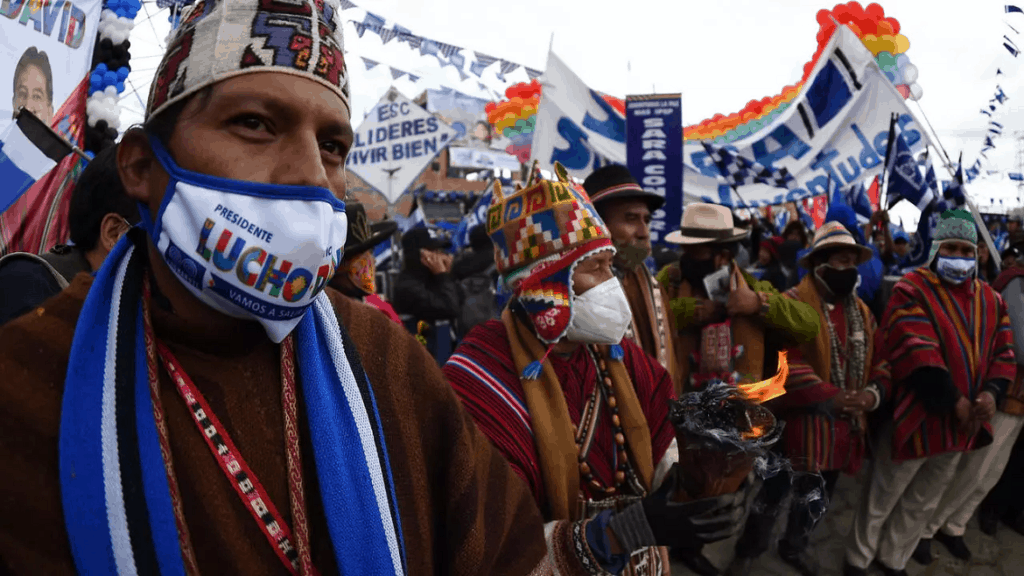By Maria Isabel Nino- Rada
The Plurinational State of Bolivia is a country of west-central South America, bordered to the north and east by Brazil, to the southeast by Paraguay, to the south by Argentina, to the southwest and west by Chile, and to the northwest by Peru.
 The country has been landlocked since it lost its Pacific coast territory to Chile in the War of the Pacific (1879–84), what made Bolivia agree with neighboring countries an indirect access to the Pacific and Atlantic oceans. The constitutional capital is the historic city of Sucre, where the Supreme Court is established, but the administrative capital is La Paz, where function the executive and legislative branches of government.
The country has been landlocked since it lost its Pacific coast territory to Chile in the War of the Pacific (1879–84), what made Bolivia agree with neighboring countries an indirect access to the Pacific and Atlantic oceans. The constitutional capital is the historic city of Sucre, where the Supreme Court is established, but the administrative capital is La Paz, where function the executive and legislative branches of government.
This country has a rich history. It was once the center of the ancient Tiahuanaco empire, and from the 15th to the early 16th century it was a part of the Inca empire. After the arrival of the conquerors, Bolivia was part of the Viceroyalty of Peru, and it provided Spain with silver. Bolivia was declared independent in 1825 and adopted its first constitution in 1826, establishing a unitary system of government. A revised version of the 1967 constitution was promulgated in 1994 vesting executive power in a president directly elected by popular vote for a five-year term. In January 2009, a new constitution was approved by accord of Evo Morales, elected president in 2005 with an absolute majority. This constitution allowed the president to serve another consecutive five-year term.
The arrival of Evo Morales to the presidency was historical, since the country had been traditionally governed by minority elites compared to indigenous and mestizo majorities. He promoted measures to guarantee indigenous rights, such as their participation in the parliament. The inclusion of new actors in the political arena created a tension between the liberal model of party mediation for representation and social organizations and movements that emerged into political life but had no place in parliament.
Elections took place on October 20, 2019. Five days after, the Supreme Electoral Tribunal declared Evo Morales as the winner, beating Carlos Mesa of the Citizen Community opposition party by only 10%, which made necessary to have a second round, but this did not occur. On November 10, Morales announced that he will repeat elections and that the members of the Superior Electoral Tribunal would be renewed.
There is consensus to affirm that on November 11 occurred a coup d’état in Bolivia because of the public statements of the commander of the Bolivian armed forces, who withdrew its support for Evo Morales and asked him to resign. These declarations were supported by the fact that the army was acting passively in the face of disturbances caused by the opposition because of Morales’ attempts to remain in power, despite having lost the re-election referendum and the fact that the elections were denounced as fraudulent in 2019 according to OAS verification.
These events led to vast violations and abuses of human rights, including at least 30 dead and more than 800 injured. That is why last November, the Office of the High Commissioner deployed a mission in Bolivia that still remains in the Andean country with the mission of monitoring and reporting on any violation and abuse of human rights, including in the field of elections.
Jeanine Añez, from the Social Democratic Movement, assumed the presidency after the resignation of Evo Morales without a quorum. However, the Constitutional Court affirmed that her election was in accordance with the Constitution because, in the event of a vacancy in the presidency, those who succeed in hierarchical order must assume the presidency ipso facto.
Bolivia’s Supreme Electoral Tribunal announced on July 23 that the presidential elections would be held on October 18, which meant a second postponement of the elections originally scheduled for May 3 and then postponed to September. The Court based its decision on medical reports pointing to a peak in the COVID-19 pandemic for late August and early September.
The Interamerican Commission on Human Rights followed the demonstrations carried out by different social organizations in Bolivia in rejection of the decision of July 23, 2020 of the Supreme Electoral Tribunal. Such demonstrations consisted of marches, concentrations, and the closure of the crossing on different highways in 78 urban and rural points of La Paz, Cochabamba, Santa Cruz, Oruro, Potosí, Beni, and El Alto.
On Sunday 18 October, new elections are held in Bolivia, after the crisis that triggered last year’s vote. The UN High Commissioner for Human Rights, Michelle Bachelet expressed her desire for the electoral contest to unfold in a peaceful, participatory and inclusive way and in a climate of respect for human rights, without intimidation or violence. She added that these elections represent an opportunity to advance on the social and economic fronts, and to reduce the extreme polarization that it has affected Bolivia in recent years.
The High Commissioner expressed her concern at the statements and threats made by some politicians in recent weeks, and at the growing increase in physical attacks that could trigger clashes. She urged the authorities, politicians and social representatives to avoid any action that could affect the peaceful development of the elections.
The Interamerican Commission on Human Rights reiterated that the States must take the proportionate actions to prevent and avoid acts of violence in protest contexts, but is aware of the particular challenges of exercising and guaranteeing the right to protest in the current context of a pandemic; particularly, taking into account the current dynamics within Bolivian society and the recent history of conflict in the political-electoral context. For this reason, it recommended a national process of dialogue and reconciliation to be conducted at the highest level of the State with the aim of defusing latent tensions and hostilities in Bolivian society.
Author: María Isabel Niño Rada (Professional Specialized in Presidential Council for Human Rights and International Affairs; Lawyer and professional in International Relations from the Universidad del Rosario, Colombia; Diploma in International Protection of the Human Rights of Women from the Universidad Austral, Argentina. She is currently enrolled in a Postgraduate degree in Constitutional Law at the Pontificia Universidad Javeriana. Bogotá D.C. Area, Colombia)
(The views expressed in this article belong only to the author and do not necessarily reflect the views of World Geostrategic Insights)







